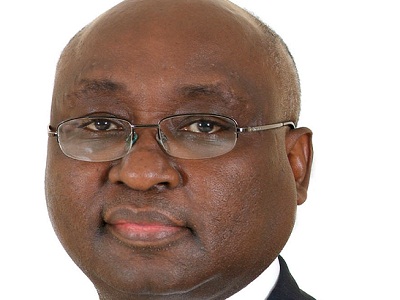E-Financial
Study Shows How Banks Engage in Arbitrary IT Budgeting

Over budgeting for IT was prevalent in many Nigerian banks over a period of four years between 2005 and 2009, suggesting management eagerness to approve IT budgets irrespective of their merits. Bank management and IT practitioners engaged in power budgeting that relies on the influence of powerful executives and IT managers to approve IT budgets rather than on higher IT resource utilization and efficiency, which base IT budget approval on data generated. This is the thrust of the findings of a research by Dr. Godfrey Ekata, a United States-based adjunct professor of information technology, who investigated IT Productivity Paradox: Evidence from the Nigerian Banking Industry. The study published recently in the Electronics Journal on Information Systems for Developing Countries (EJISDC), sought to determine whether or not a relationship exists between IT expenditure and the financial performance of the Nigerian banks during the period. Ekata said that deploying ICT infrastructure in Nigeria is capital-intensive such that the banks’ annual IT spending was increasing dramatically, supposedly to enable them stay competitive and profitable in a modern economy. However, the study revealed that there is little or no evidence that increased IT investment or spending results in increased financial performance or productivity gain. According to Dr. Ekata, “analysis of IT expenditure and financial performance data of the banks showed no relationship between IT investment spending and net profit, suggesting the existence of IT productivity paradox in the Nigerian banking industry.” As he put it, the annual IT spending in Nigerian banks which stood at $150,000 in 2003 rose to approximately $117million in 2009. Ekata said that the interest in knowing what relationship exists between increased IT investment and financial performance of the Nigerian banking industry was motivated by continued increase in IT spending by Nigerian banks over the period and by a dearth of research on the subject in sub-Sahara Africa. He explained that IT budgeting should be a means of planning, monitoring, and control of future operations and results with due regard to the preceding fiscal year; stressing that the degree of success of IT depends on contextual factors that include IT strategies, management, and capability. Research findings he stated have shown that IT, on average, has a less than significant impact on organizations’ performance. Dr. Ekata observed that IT executives in the Nigerian banking industry need to adopt IT strategies that emphasize efficient IT management and utilization, warning that until Nigerian banks optimize the capacity of their IT investments the full benefits of the technology may continue to elude them, and further ICT deployment will not matter. The research finding showed that besides low utilization, failure of banks to translate increased IT spending into corresponding profits could also be the result of other factors such as negative network effects, misalignment between business objectives and IT strategies, and technical inefficiency. He advised Bank leadership in Nigeria to promote full utilization of IT by staff and customers to avoid negative network effects because ICT infrastructure can exhibit decreased value from low utilization. To ensure full realization of the benefits of IT investments, the study called on Nigeria bank executives and practitioners to tailor their IT investment strategies to align with their business objectives. The strategies could include IT cost reduction plans that challenge IT managers to: (a) commit to delivering measurable value for IT projects before granting budget approval; (b) offset the added cost of new IT project investments with reasonable reductions in maintenance cost; (c) examine the costs and benefits of new projects, delaying upgrades, and discontinuing maintenance agreements; and (d) implement only the essential features of IT solution. The results from Dr. Ekata’s study should help Nigerian bank executives in evaluating their IT investment policies, rationalizing IT spending, and allocating technology resources to achieve optimum results. He noted that IT adoption involves leadership challenges at various levels including information systems management, budgeting, outsourcing, offshoring, partnerships, and competitiveness. The challenges require leadership decisions that are consistent with efficient management and high IT utilization. It concluded that where organizational leadership fails to align IT strategy with organisation’s objectives and guide against IT project failures, ICT will truly not matter.
E-Financial
NIBSS, Others Flag 13,417 Nigerian Fraudsters on Person of Interest Portal

At least 13,417 individuals linked to fraudulent activities in Nigeria’s financial system have been captured on the Person of Interest Portal jointly developed by the Nigeria Inter Bank Settlement System (NIBSS) in collaboration with the Central Bank of Nigeria (CBN), security agencies and other stakeholders.

Premier Oiwoh, managing director of NIBSS, disclosed this while speaking on ongoing efforts to curb fraud in the payments ecosystem, noting that the portal which contains names and photographs of suspects has been actively used by law enforcement agencies since it began capturing data from 2019.
Oiwoh, while noting that fraud management remains a core responsibility of NIBSS, noted that the number of reported fraud cases has declined over the past five years, the value of losses remains a key concern for regulators and operators.
According to him, actual fraud losses stood at about N17.67 billion in 2023 before rising sharply to N52.26 billion in 2024, mainly due to a single incident involving N31.1 billion by one entity. He noted, however, that losses dropped significantly in 2025, reflecting tighter controls and improved collaboration across the industry.
He explained that Lagos continues to account for the highest concentration of fraud cases due to its position as the country’s commercial hub, while Abuja has also recorded a notable rise, with other states still featuring in reported incidents.
By transaction channel, Oiwoh said fraud is most prevalent in e-commerce and internet banking, followed by POS, mobile and web platforms.
He identified social engineering as the most common technique used by fraudsters, warning that insider abuse now poses the greatest threat to the system.
“Insider involvement is high, and recent investigations have confirmed this. Many of the fraud cases we are seeing today involve insiders, including former bankers,” he stated, noting that coordinated industry action has yielded results, and that joint efforts last year alone prevented losses of about N20 billion that could have been lost to fraud.
He raised concern over non-reporting of fraud incidents revealing that fraud reporting declined by about 34 per cent in the last quarter of 2025.
He warned that failure to report allows perpetrators to move freely between institutions undetected.
“In several cases investigated last year, individuals involved in fraud simply moved to other institutions because incidents were not reported. Non-reporting is unacceptable,” he said.
He said NIBSS, working with the CBN, the Nigerian Financial Intelligence Unit, and security agencies, has integrated centralised data systems, including industry watch lists, politically exposed persons databases, and customer account repositories, into the Person of Interest Portal to strengthen monitoring, identity management, and fraud prevention.
Credit… Leadership
E-Financial
CBN Prepares Fresh Debit Card Rules to Improve ATM Services

Central Bank of Nigeria (CBN) is to introduce new rules to improve how debit cards and Automated Teller Machines (ATMs) work in Nigeria, according to Olayemi Cardoso, governor of the apex bank.

Cardoso, made this known through Fatai Karim, his special adviser, at an event held over the weekend.
According to him, the new rules are meant to solve ongoing problems with cash withdrawals and to restore public trust in electronic payment systems.
The CBN explained that banks will now be required to issue debit cards based on the number of ATMs they have installed. This means a bank should not issue too many cards if it does not have enough ATMs to support them.
The policy is expected to reduce long queues at ATMs, frequent machine breakdowns, and uneven access to cash across the country.
The CBN noted that repeated ATM failures and cash shortages have made many Nigerians lose confidence in digital banking, even though electronic transactions are increasing.
The Governor said the new policy will soon be introduced to clean up the system and ensure banks properly balance the number of debit cards they issue with the ATMs they operate.
E-Financial
First Asset Management Receives Upgraded Ratings from Agusto &Co and DataPro

First Asset Management, a subsidiary of FirstHoldCo Plc has recorded a significant milestone as its rating was upgraded to ‘AA’ from ‘AA-’ by DataPro, reflecting the firm’s strong fundamentals and sustained resilience in Nigeria’s Asset management landscape.

The rating upgrade, issued in DataPro’s latest rating report, underscores First Asset Management’s diversified income base, high-quality investment portfolio, and experienced team, all of which continue to support the firm’s long-term stability, sound governance framework, and consistent performance.
The improved rating highlights the organisation’s ability to maintain strong operational fundamentals while effectively navigating market cycles. It further reflects First Asset Management’s disciplined investment philosophy, prudent risk management practices, and commitment to delivering value-driven solutions to its clients.
Speaking on the upgrade, Ike Onyia, Managing Director/CEO of First Asset Management, stated, “We are pleased with DataPro’s decision to upgrade our rating to ‘AA’. This recognition affirms the depth of our investment expertise, and the consistency of our governance and risk management processes. We remain focused on sustaining strong performance while delivering reliable investment outcomes for our clients.”
In a related development, Agusto & Co. has upgraded the rating of the First Asset Money Market Fund to ‘Aa-(f)’ from ‘A+(f)’, further reinforcing the strength of First Asset Management’s product offering.
According to Agusto & Co., the upgraded rating reflects the fund’s consistent low exposure to interest rates and liquidity risks, as well as the fund manager’s commendable professionalism and prudent investment approach. The rating affirms First Asset Money Market Fund’s position as a formidable investment vehicle for capital preservation and steady income generation.
First Asset Management continues to maintain a strong position within Nigeria’s asset management industry, supported by its disciplined investment framework, experienced investment professionals, and a growing suite of products designed to meet the evolving needs of retail and institutional investors.
DataPro and Agusto & Co. are both recognized leaders in ratings and investment research in Nigeria, with extensive experience providing independent assessments across multiple sectors. Their ratings are widely accepted as benchmarks for evaluating financial strength, risk management, and business sustainability.
First Asset Management is a leading Nigerian investment manager within the FirstHoldCo Group. The firm has evolved into a full service investment platform, offering integrated wealth and portfolio solutions across the Group.
First Asset Management manages diversified strategies spanning fixed income, equities, alternatives, passive and quantitative products, in multiple currencies for a variety of individual, intermediary and institutional clients.

 Telecom3 days ago
Telecom3 days agoNew Investment Fund Targets Acceleration of Emerging Technology in Nigeria

 General News2 days ago
General News2 days agoPalmPay User Shares Experience on Fintech Apps to Trust in Nigeria

 News2 days ago
News2 days agoStakeholders Demand Stronger Governance and Infrastructure to Drive Tech Adoption @ Lagos AI Summit

 General News2 days ago
General News2 days agoNigerians Target Self-Improvement, Business Startups in 2026 Google Data

 News2 days ago
News2 days ago35 Million Nigerians Face Acute Hunger in 2026, UN Warns

 General News2 days ago
General News2 days agoHow Inside Jobs and Policy Shocks Trigger Nigeria’s Rising Loan Crisis

 E-Financial10 hours ago
E-Financial10 hours agoFirst Asset Management Receives Upgraded Ratings from Agusto &Co and DataPro

 General News10 hours ago
General News10 hours agoNigeria Treats Religious Violence as Attack on State – NSA Ribadu













